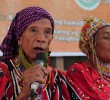The law that amends the Organic Act that created the Autonomous Region in Muslim Mindanao will be up for ratification in August. But the law, signed recently by President Gloria Macapagal-Arroyo, has infirmities that the Moro National Liberation Front (MNLF) is strongly objecting to � these are the same defects that made Mindanao the powder keg that it is today.
By Carlos H. Conde
Bulatlat.com
DAVAO CITY — If the government will have its way, it will perpetuate � through the amended version of the law that created the Autonomous Region in Muslim Mindanao (ARMM) — the same set-up that gave birth to the Moro rebellions in Mindanao in the first place.
On August 14 the government will submit, for ratification by the people of the ARMM, Republic Act (RA) 9054 signed by President Arroyo a few weeks ago. RA 9054 amends RA 6734 which created the ARMM. The amendment of RA 6734 is necessary for the full implementation of the peace agreement signed by the government and the Moro National Liberation Front (MNLF) in 1996. Under the peace agreement, the amended law should be subject to a plebiscite in the provinces and cities that compose the ARMM.
This early, however, the MNLF has said that it won�t recognize the results of the plebiscite, saying it is contrary to the letter and spirit of the peace agreement and that, besides, there�s hardly any information drive going on to raise awareness of the plebiscite.
Randolph Parcasio, the MNLF�s legal counsel, said here that the amendatory law is unilateral in that the government did not consult the MNLF and the Organization of Islamic Conference (OIC) in the crafting of the amendment. �They should have consulted the MNLF and the OIC before passing the amendatory law,� Parcasio said, adding �I hope the President is given correct advice on this matter.�
A contentious point in the amendments, which Parcasio described as �a very explosive issue that has to be immediately resolved correctly by the government,” is the matter of ancestral domains and the exploitation of the natural resources within the jurisdiction of the ARMM.
Under the 1996 peace agreement, �the exploration, exploitation, development, utilization and protection of mines and minerals in the area of autonomy shall be vested in the regional autonomous government.� Exempted from the coverage of this provision are �strategic minerals which will be defined later.� The definition of these minerals, the MNLF contends, should be done by both sides.
But the government, Parcasio said, acted unilaterally when it went on to identify these minerals, so that in the amended ARMM law, the autonomous government�s jurisdiction over minerals and natural resources, particularly ancestral domain areas, has been severely limited.
Section 1, Article X of the amended law reads: �All lands and natural resources in the autonomous region that have been possessed or occupied by indigenous cultural communities since time immemorial, except when prevented by war, force majeure or other forms of forcible usurpation, shall form part of the ancestral domain. Such ancestral domain shall include pasture lands, worship areas, burial grounds, forests and fields, mineral resources, except strategic minerals such as uranium, coal, petroleum; and other fossil fuels, mineral oils, and all sources of potential energy; lakes, rivers, and lagoons; and national reserves and marine parks as well as forest and watershed reservations.� (Underscoring supplied.)
Moreover, Section 5, Article XII of the same amended law reads: �The control and supervision over the exploration, utilization, development, and protection of the mines and minerals and other natural resources within the autonomous region are hereby vested in the regional government in accordance with the Constitution and the pertinent provisions of this Organic Act except strategic minerals such as uranium, petroleum, and other fossil fuels, mineral oils, all sources of potential energy, as well as national reserves and aquatic parks, forest and watershed reservations already delimited by authority of the central government or national government and those that may be defined by an Act of Congress within one (1) year from the effectivity of this Organic Act.” (Underscoring supplied.)
Unilateral, arbitrary and unconscionable
Not surprisingly, the MNLF took umbrage at these provisions, which are among the 10 other provisions the group is objecting to. In a matrix of objections released to the media, the MNLF said that �the (government), acting through Congress, has unilaterally, arbitrarily and unconscionably arrogated unto itself the power to define strategic minerals, violating the peace agreement. This negates the agreement, which mandates that the MNLF and the (government), with the positive contribution of the technical experts of the OIC, will mutually agree on the definition of strategic minerals on a latter date.�
In fact, the definition of minerals that the government put in the amended law was the same as the one it submitted during the negotiations for the peace agreement. The MNLF rejected the government�s list at the time, leading to the provision that set the definition at a later date.
Thus, according to the MNLF, �any attempt to define strategic minerals unilaterally is unacceptable as it violates the agreement. The intent was to come up with a tripartite expert definition of strategic minerals and the same must be done before the crafting of the amendatory bills.�
Robbing native inhabitants
Moreover, the MNLF argues that the provisions �will rob native inhabitants in the autonomous region of their birthright over their God-given natural resources which by law is presently protected and strengthened by Republic Act 8371 (the Indigenous People�s Rights Act or Ipra).�
According to the MNLF, the amended law will deprive �Muslim and non-Muslim indigenous cultural communities and indigenous peoples who are inhabitants in the autonomous region of their vested rights over their ancestral domains� as provided in the Ipra.
“The indigenous communities, both Muslims and Christians, will have no control over mines and minerals including our waters, lakes, rivers situated within the proposed autonomous areas. In short, the new law will remove from the indigenous communities their rights over their ancestral domain,” Parcasio said.
The Ipra recognizes the right of indigenous peoples and communities over their ancestral domains. The law says that these people �shall have priority rights in the harvesting, extraction, development or exploitation of any natural resources within the ancestral domains.�
Jurisdiction
The crux of the MNLF�s opposition to the provisions is that these �strike at the heart of the jurisdiction of the autonomous government over mines and minerals within its territory.�
Further, if the amended organic act is ratified and passed, it will practically give to the government carte blanche powers over the ARMM and its natural resources, thus compromising the spirit of genuine autonomy. This issue also gives substance to the recurrent complaint by the MNLF and government critics that the supposed autonomy in the ARMM is a sham.
The amended law, however, would fit perfectly in the government�s drive to convert large tracts of lands in Mindanao into plantations and other extractive businesses, such as mining and oil exploration in Moro areas. Already, the government, aided by Big Business, is heavily promoting the conversion of Moro lands into palm oil and sugar plantations, among other ventures. Business groups in Mindanao have also scheduled visits in Moro areas in Central Mindanao for local and foreign investors.
These provisions are also expected to become a sore point in the relationship between the Arroyo administration and MNLF chairman Nur Misuari, who has consistently complained about his lack of jurisdiction in matters relating to the ARMM.
In the end, this issue will raise the question on the government�s sincerity in granting autonomy to the Moro people and the MNLF, which agreed to lay down its arms in exchange for supposed autonomy.
Development aggression
It has been the experience of Mindanao that the so-called development aggression — mainly by big mining, logging and big agricultural companies, many of them transnational corporations � has victimized mainly Moro and indigenous peoples, displacing them from their ancestral lands.
This policy of dispossession, which has been implemented in Mindanao for decades now by the tandem of government and Big Business, gave birth to the various rebellions in Mindanao.
�It must be borne in mind that the central issue that drove mainland Mindanao to violence was mainly due to landgrabbing,� the MNLF said. The government, it added, �has once again committed a disservice to the cause of peace by removing strategic minerals and (natural resources) from the scope of ancestral domain and the jurisdiction of the autonomous government.�
The amended law, the MNLF added, �shows very clearly the neo-colonialist bias of the Philippine government. Up to now, despite lessons in history, the central government wants to perpetuate control and exploitation of the natural resources in the Bangsamoro homeland.�
Petition
Meanwhile, Parcasio said the MNLF will formally petition the joint monitoring committee of the 1996 peace agreement to stop the August 14 plebiscite. He said the MNLF wants a �more acceptable� law to amend the organic act. The committee, composed of representatives from the government, the MNLF and the OIC, oversees the implementation of the peace agreement.
Last month, during the 28th Session of the Islamic Conference of Foreign Ministers, the OIC issued a resolution urging the government �not to take any unilateral measures, and in particular not to unilaterally conduct a plebiscite in ARMM in line with the peace agreement concluded between the MNLF and the (government) under the auspices of the OIC.�
The plebiscite is scheduled to take place in the provinces of Tawi-tawi, Sulu, Basilan, Zamboanga del Norte, Zamboanga del Sur, Sibuguey, Lanao del Norte, Lanao del Sur, North Cotabato, South Cotabato, Maguindanao, Sultan Kudarat, Sarangani and Davao del Sur. It will also be held in the cities of Zamboanga, Pagadian, Dipolog, Iligan, Marawi, Cotabato, Kidapawan, General Santos, and Digos. Bulatlat.com










